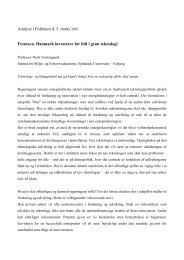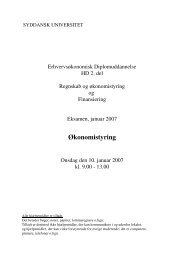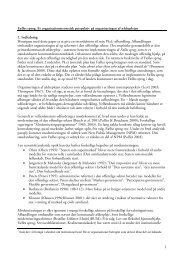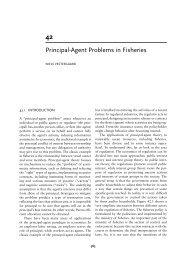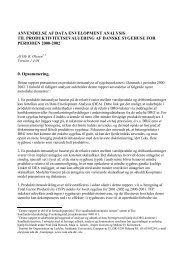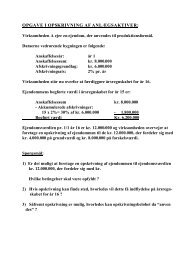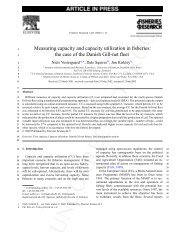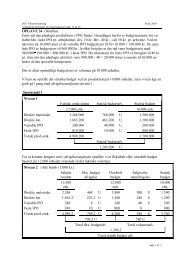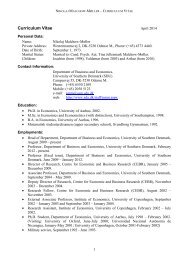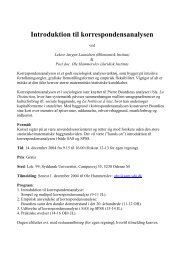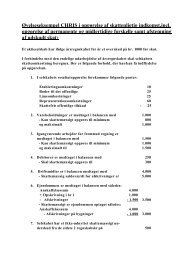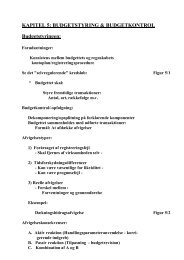Development of Parties and Party Systems in ... - lah@sam.sdu.dk
Development of Parties and Party Systems in ... - lah@sam.sdu.dk
Development of Parties and Party Systems in ... - lah@sam.sdu.dk
- No tags were found...
You also want an ePaper? Increase the reach of your titles
YUMPU automatically turns print PDFs into web optimized ePapers that Google loves.
Before 1989 “postcommunist” parties had cooperated closely with the communist parties <strong>in</strong>side thenational fronts, other “historic” parties had been outlawed under the communist rule <strong>and</strong> were“reborn” after the demise <strong>of</strong> communism. We also f<strong>in</strong>d parties established almost spontaneously<strong>and</strong> maybe therefore hardly can be placed on a right-left scale 16 . In some cases, the memories aboutthe upris<strong>in</strong>gs aga<strong>in</strong>st the communist regimes <strong>and</strong> the circumstances <strong>and</strong> the ways <strong>of</strong> demise <strong>of</strong> theold regime had created specific “foundation myths”, lead<strong>in</strong>g to “early freez<strong>in</strong>g” <strong>of</strong> old socio-culturalcleavages.The agrarian parties can not easily be placed on the right-left axis. In Pol<strong>and</strong> the peasants party PSLhave constituted a centre-left party because <strong>of</strong> the historic background <strong>in</strong> the communist period <strong>and</strong>the cooperation with left alliance SLD after 1990. The Christian-Democratic KDU-CSL took part <strong>in</strong>the ODS-led governments <strong>in</strong> the Czech Republic, after the 2002 election <strong>in</strong> Vladimir Spidlas socialdemocratic led government. In Hungary, the Smallholders <strong>Party</strong> (FKGP) has appeared as an classparty only enter<strong>in</strong>g coalitions with the centre-right Hungarian Democratic Forum (MDF) <strong>and</strong>FIDESZ.The right-leftPost-communist conflicts <strong>and</strong> cleavagesdimension deviatedfrom those known• (post)communism versus anticommunism (all countries)from alreadyestablished partysystems <strong>in</strong> the• state versus church (e.g. Pol<strong>and</strong>)West. Cleavages <strong>in</strong>the post-communist• liberalism versus cosmopolitism (e.g. Hungary)CEECs tended tobe• National ethnic conflicts (e.g. <strong>in</strong> Slovakia)multidimensional<strong>and</strong> as rightlyagued by Mikos• Free market versus regulated market the Czech Republic) Haraszti to aextent alsoculturally <strong>and</strong>polically(communist-anticommunist) based 17 . There has therefore rightly been talked about specific“cleavages <strong>and</strong> conflict l<strong>in</strong>es <strong>of</strong> transformation” (Hlousek etc, 2004:48). In the first stage the parties<strong>and</strong> <strong>in</strong>dividual participants became representatives <strong>of</strong> the (post) communism versus anticommunismconflict. In the later stages <strong>of</strong> post-communism the socio-economic cleavages, e.g. the conflictabout the free market versus regulated market conflict, became more strik<strong>in</strong>g <strong>and</strong> not only <strong>in</strong> theCzech Republic. Cultural cleavages, <strong>in</strong>clud<strong>in</strong>g national ethnic conflicts have especially beenstrik<strong>in</strong>g <strong>in</strong> the “deviat<strong>in</strong>g case” <strong>of</strong> Slovakia, maybe due to the late <strong>and</strong> complex nation build<strong>in</strong>g, thatbrought the parties <strong>and</strong> party systems unstable, “immature” <strong>and</strong> “non st<strong>and</strong>ard” characteristics.Opposite, socio-economic cleavages have been rather weak <strong>in</strong> the case <strong>of</strong> Slovakia1.7. Anti-communism <strong>and</strong> the Right16 Michal Klima, “Consolidation <strong>and</strong> Stablization <strong>of</strong> the <strong>Party</strong> System <strong>in</strong> the Czech Republic”, Political Studies(1998):496.17 Miklos Haraszti, “Young Bloods, Hungary’s election results promise a new taste <strong>of</strong> political salami”, Transitions,July 1998:48-52.23



